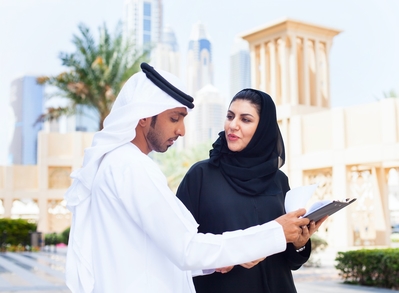 Many misconceptions about Arabic cultures exist, but there is one simple definition of what it means to be Arab: to be part of a nation where the dominant language is Arabic.
Many misconceptions about Arabic cultures exist, but there is one simple definition of what it means to be Arab: to be part of a nation where the dominant language is Arabic.
These nations include Algeria, Bahrain, Egypt, Iraq, Jordan, Kuwait, Lebanon, Libya, Mauritania, Morocco, Oman, Palestine, Qatar, Saudi Arabia, Somalia, Sudan, Syria, Tunisia, the United Arab Emirates (UAE), and Yemen. This group of nations is remarkably diverse with its tribal groups, isolated countries, and modern metropolitan cities and economies. Nomadic tribes still wander the deserts in this region, standing in sharp contrast to the sparkling cities of the UAE. Some of them are just emerging into the modern world, and others have cultures that are as old as any on Earth, such as Egypt, Iraq, and Syria.
Most Arabs live lives focused on creating families and taking care of them. There is no more important structure in these societies than the family, and mostly they tend to be large. As economic wealth and education spreads throughout the Arab populations, however, family size is getting smaller.
Dress varies throughout the region, from the white kandura for men in the UAE to the abaya (the long, black cloak worn by women) or burqa (the cloak that covers all skin). Typically, men have more freedom in dress style than women, and you will often meet local UAE Arabs dressed as Westerners in Levis and sports jackets. It is always best for women to dress conservatively in the Middle East.
Modern Arab businessmen, while they vary across the region, are cosmopolitan and typically aren’t offended by most Western practices. Nonetheless, it will not hurt if you understand some basics. These include using your right hand for shaking hands or for handing things to people. The left hand is used for personal hygiene and is considered unclean, and the belief is deeply ingrained.
Arabs are passionate people, but they refrain from attacking each other. Personal attacks can damage a relationship. Learn to differentiate passion from personal attacks. In the Middle East, people giving each other directions can look as if they are about to start a brawl, but if they really disagreed about someone’s knowledge of the neighborhood, their tones would change dramatically.
Businesspeople in the region also work to build relationships by networking, using a concept called wasta in Arabic. It means “to connect with preference.” People who work in the region know that you need to first find someone who knows the person you want to meet. Only then should you email or call them. They’ll call you back because you have preference created by your friend.
When you meet with an Arab in the Middle East, be prepared to devote some considerable time to a chat, establishing your social connection. Talk about family, where you have been traveling, what they are doing, whom you know in common. Then, and only then, get down to business. To you it may feel efficient that at the end of the day you can squeeze in an extra meeting because you got to the point quickly. To the Arab, it will feel abrupt and inappropriate.
Because of the strength of many economies in the region, it is important to invest time getting to know more about the country you will visit or people you will meet from the region. Remember, all business in the Middle East is personal. Spend time developing personal relationships before you actually develop a business relationship. Learn something about Islam, particularly so that you can avoid inadvertently insulting the people with whom you will meet. Decisions take a long time to make. The entire culture has a more long-term view than you probably do, so slow down.
Learn a few Arabic words while you are waiting for your relationship to come to fruition. Always try to speak face to face or at least by telephone. Written communication is not as valued, as it is considered less personal. If you are working on a large business arrangement, you will definitely need to meet in person. Make it your responsibility to tie things down at the conclusion of all your meetings so that all those in attendance will know what has been agreed to and what the next steps are. Everyone will be happier with that.
While a strong marker, religion is not a defining feature of Arab cultures. Many Arabs are Islamic, but there are several other religious groups within the Arabic cluster of nations. Christians live throughout the Arab world, as do Jews, although limited in number. Muslims, about 93% of the population, are divided into two main groups: the Shia and the Sunni. Those two divisions within Islam are stronger than the divisions between Catholics and Protestants. There are dominant Islamic nations that are not Arabic, such as Iran, Pakistan, Afghanistan, Turkey, Malaysia, and Indonesia. In fact, Arabs make up only about 15% of the world’s Muslim population.